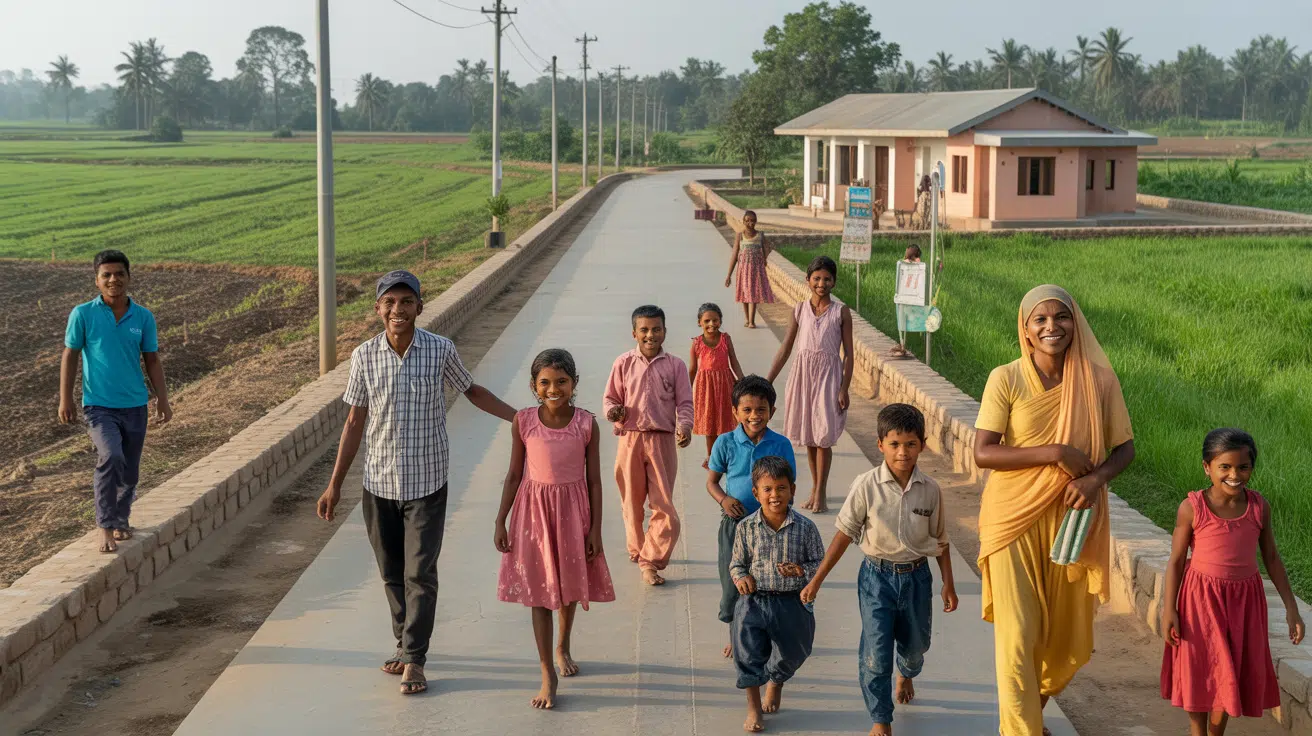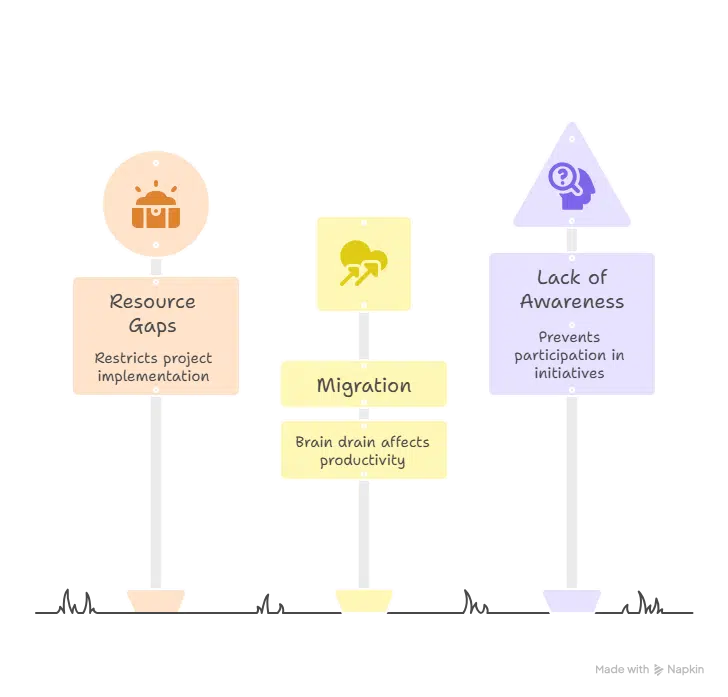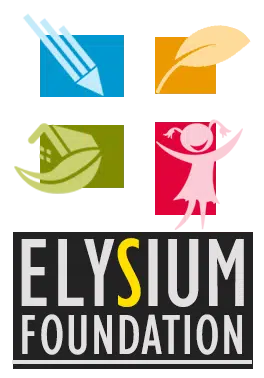
18 Aug The Importance of Rural Development: Transforms Communities for a Better Future
Rural development plays a crucial role in shaping the future of India, where a significant portion of the population resides in villages. Have you ever wondered how empowering rural communities can transform not only individual lives but entire regions? The Elysium Foundation understands this deeply and works relentlessly to foster rural development as a pathway to sustainable growth and improved livelihoods. Their commitment to the importance of rural development reflects a vision where every village thrives with opportunity, skills, and hope.
Rural development, often referred to as countryside progress or grassroots upliftment, involves comprehensive efforts to improve the economic and social conditions of village communities. For Elysium Foundation, importance of rural development means creating infrastructure, providing education, and empowering people with skills that ensure lasting change. The Foundation believes rural development is essential now more than ever due to the challenges rural areas face, such as limited access to education, employment, and healthcare. Their work in rural development aims to bridge these gaps and ignite community-led transformation. Through their sustained focus on rural development, Elysium Foundation strives to build resilient and self-sufficient villages, enabling people to lead dignified and enhanced lives.
The Need for Rural Development

Rural communities face critical challenges that limit their growth and well-being. Understanding these issues point by point highlights the importance of rural development and why focused interventions are essential. From limited infrastructure to lack of healthcare and educational opportunities, these gaps slow progress and widen inequalities. Addressing these needs is crucial to unlocking the potential of rural areas and ensuring inclusive progress, further reinforcing the importance of rural development in building sustainable and resilient communities.
- Limited Infrastructure:
Rural areas often lack essential infrastructure like good roads, reliable electricity, clean water, and sanitation facilities. This limitation restricts access to markets, healthcare, and education, slowing down economic and social progress. - Inadequate Access to Quality Education and Healthcare:
Many villages do not have proper schools or healthcare centers, which leads to low literacy rates and poor health outcomes. Without education and healthcare, residents cannot improve their life prospects effectively. - Lack of Economic Opportunities:
Employment options in rural regions are often scarce and confined mainly to agriculture, which can be seasonal and uncertain. This absence of diverse income sources causes financial instability among families. - Youth Migration to Urban Centers:
Due to the shortage of jobs and developmental resources, many young people leave rural communities to seek work in cities. This migration causes a loss of skilled individuals, weakening local economies and social structures. - Need for Equitable Access to Resources:
To break the cycles of poverty, it is essential that rural populations gain fair access to education, healthcare, infrastructure, and economic opportunities. - Elysium Foundation’s Role:
The foundation identifies these challenges as critical and actively engages in programs to overcome them, focusing on sustainable development and empowering rural communities to uplift themselves socially and economically.
Pillars of Rural Progress: Understanding the Importance of Rural Development
The importance of rural development depends on strengthening key areas that directly support community growth and long-term progress. Core pillars such as infrastructure, economic empowerment, education, healthcare, and social inclusion form the backbone of this process. By improving roads, connectivity, and basic services, rural areas become better integrated with wider markets. Promoting entrepreneurship and livelihood opportunities drives economic independence, while quality education and healthcare ensure healthier, skilled generations. At the same time, fostering social inclusion builds stronger, more resilient communities. Together, these interconnected elements create a solid foundation for sustainable and balanced rural advancement.
- Infrastructure Growth:
Firstly, building and improving infrastructure such as roads, electricity, and sanitation is fundamental. These developments provide the backbone for economic activities and improve the overall quality of life. - Economic Empowerment:
Additionally, creating job opportunities and encouraging entrepreneurship are vital for self-sufficiency. By equipping rural residents with skills and access to markets, economic independence is achievable. - Education and Skill-Building:
Furthermore, enhancing education and vocational training paves the way for long-term progress. Knowledge and skills empower individuals to seize opportunities and contribute meaningfully to their communities. - Healthcare Access:
For example, ensuring availability of healthcare services addresses health disparities and supports a healthy, productive population. - Social Inclusion:
Lastly, fostering inclusion of marginalized groups and promoting gender equity strengthens community resilience and harmony.
Together, these pillars form the foundation of effective importance of rural development , driving comprehensive and lasting change.
Overcoming Barriers: Highlighting the Importance of Rural Development

Rural development faces several significant obstacles that slow progress and make sustainable change difficult. The importance of rural development is often hindered by challenges such as limited resources, migration of youth to urban areas, and lack of awareness about opportunities. Recognizing these barriers is essential to designing effective strategies that address the real needs of communities. By overcoming these challenges, policymakers and stakeholders can unlock the true potential of villages, paving the way for meaningful and lasting rural transformation.
- Resource Gaps:
Many rural areas suffer from insufficient financial resources, limited infrastructure, and lack of access to technology. These gaps restrict the implementation of development projects and hamper overall growth. - Migration:
The continual migration of skilled youth to cities in search of better opportunities leaves rural communities with fewer human resources to drive local development. This brain drain affects productivity and innovation. - Lack of Awareness:
Limited access to information and education results in a lack of awareness among rural populations about their rights, government schemes, and opportunities for development. This ignorance prevents full participation in progress initiatives.
Despite these challenges, solutions exist. Through community empowerment, education, partnerships with NGOs, and strategic government intervention, these barriers can be addressed. The Elysium Foundation actively works to bridge resource gaps, engage youth, and spread awareness, fostering an environment conducive to lasting rural transformation.
Innovative Solutions

Creative and participatory approaches are vital to address the unique needs of rural communities. Innovative solutions that leverage local knowledge, partnerships, and technology play a crucial role in driving progress. These methods highlight the importance of rural development, as they have proven successful in empowering villages, fostering self-reliance, and creating sustainable growth.
- Skill Development Programs:
Elysium Foundation has introduced training programs in rural communities that teach valuable vocational skills such as crafts, agriculture techniques, and entrepreneurship. These programs enable individuals to start their own businesses or improve existing livelihoods. - Community-Driven Development:
Unlike traditional models where decisions are made externally, Elysium engages local populations in planning and implementing projects. This inclusive approach ensures that initiatives are culturally relevant and truly address the community’s specific needs. - Partnerships and CSR Collaboration:
Working with corporate social responsibility programs, Elysium Foundation leverages additional resources for infrastructure development, such as building schools, sanitation facilities, and health centers, which help sustain long-term rural growth. - Positive Impact Outcomes:
As a result of these combined efforts, many rural families have experienced increased income stability, better living conditions, and enhanced social cohesion.
The Role of Education and Skills in Rural Transformation
Education and skills development are vital aspects of the importance of rural development because they empower individuals and communities to improve their quality of life. Access to quality education in rural areas provides the foundation for learning, confidence, and growth, which are essential for driving sustainable rural transformation. Alongside education, skill-building initiatives tailored to the specific needs of rural populations create opportunities for employment and entrepreneurship, reinforcing the broader goals of rural development.
The importance of rural development lies in addressing the persistent challenges faced by rural communities, such as limited access to education and vocational training. By focusing on these areas, rural development efforts help equip residents with the abilities they need to secure livelihoods and actively participate in their local economies. Such empowerment leads to greater economic independence and social progress.
Moreover, education increases awareness about health, sanitation, and environmental sustainability—key components of comprehensive rural development. As rural populations become more skilled and knowledgeable, they can adopt innovative methods and technologies that accelerate rural progress.
In conclusion, the importance of rural development is strongly tied to education and skills, which act as catalysts to uplift individuals and communities, fostering long-lasting, positive change in rural regions.
Development Courses We Provide for Rural Empowerment
Understanding the importance of rural development, Elysium Foundation offers a variety of development courses tailored to empower rural communities. These courses focus on enhancing practical skills and knowledge critical for sustainable progress. By providing training in agriculture techniques, handicrafts, digital literacy, and entrepreneurship, we help individuals build livelihoods that directly contribute to rural development.
Recognizing the importance of rural development, our vocational programs also include tailoring, carpentry, and basic IT skills—areas that open pathways to self-employment and job creation. In addition, health education and environmental awareness are integrated into our courses to promote holistic growth in rural areas.
By offering these targeted development courses, we address key aspects of the importance of rural development and equip rural populations with the tools needed for lasting socio-economic transformation. These initiatives play an essential role in building resilient, thriving communities committed to continuous advancement.
FAQs
How can I contribute or support rural development efforts like those of Elysium Foundation?
Readers often want guidance on ways to get involved, whether through volunteering, donations, or spreading awareness.
Why is importance of rural development matter for country’s future?
People want to know how improving villages and rural areas can impact national growth and why it should matter to them.
What are the main challenges rural communities face today?
This question addresses curiosity about specific problems like poor infrastructure, lack of jobs, and why rural areas often lag behind cities.
How does the Elysium Foundation help in improving rural livelihoods?
People want to understand what concrete actions or programs the foundation runs to support education, healthcare, and economic growth in villages.
What makes community-driven rural development more effective?
This question explores why involving local people in planning and decision-making leads to better outcomes than top-down approaches.
Conclusion
In conclusion, importance of rural development is essential for balanced and inclusive national growth. The various pillars—ranging from infrastructure to social inclusion—are interconnected and critical for sustainable change. Ultimately, addressing challenges such as resource gaps and migration requires innovative, participatory solutions like those championed by Elysium Foundation. To sum up, continued support, collaboration, and community empowerment are necessary to transform rural areas and create a brighter future. Readers are encouraged to engage with or support organizations working for rural upliftment to be part of this impactful journey.




No Comments